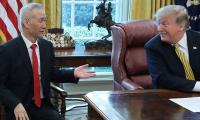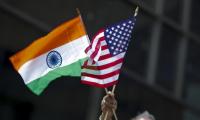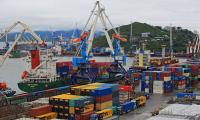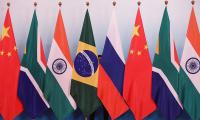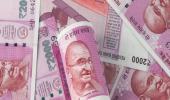Yellen Urges China to Address Trade Imbalances
US Treasury Secretary Janet Yellen called on China to address manufacturing overcapacity and create a level playing field for American companies, raising concerns about unfair trade practices during her visit.
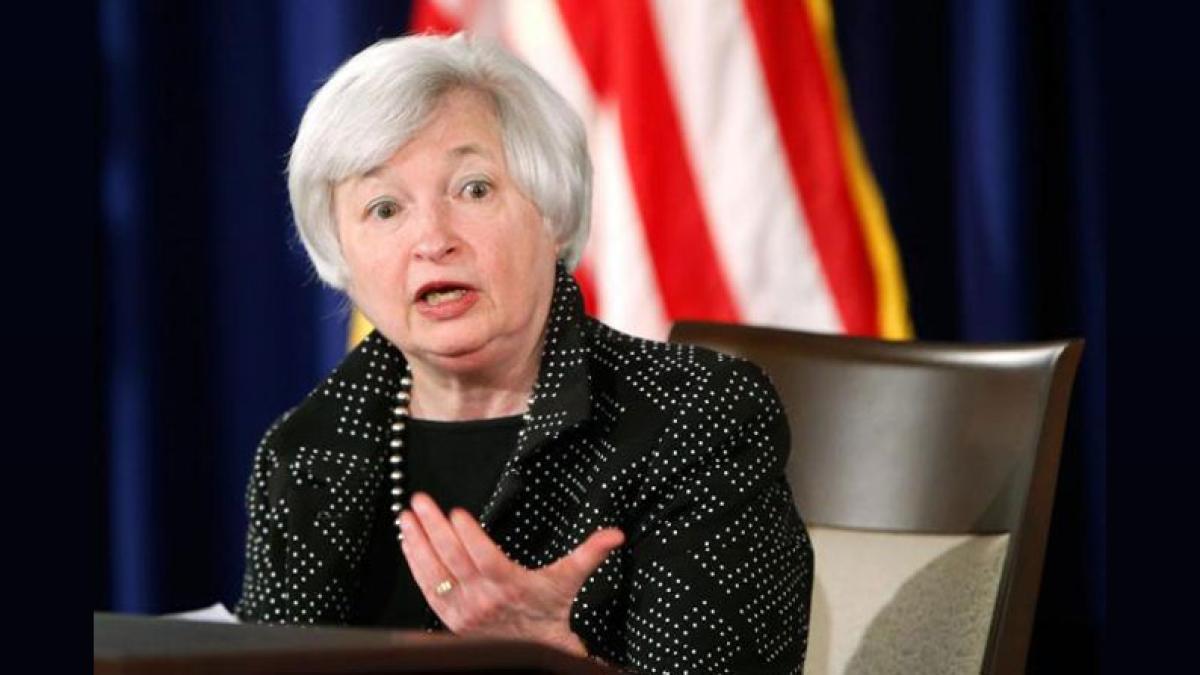
Guangzhou (China), Apr 5 (AP) US Treasury Secretary Janet Yellen called on China on Friday to address manufacturing overcapacity that she said risks causing global economic dislocation, and to create a level playing field for American companies and workers.
Starting a five-day visit in one of China's major industrial and export hubs, she raised what the U.S. considers to be unfair Chinese trade practices in talks with senior Chinese officials.
The United States seeks a healthy economic relationship with China that benefits both sides, she said ahead of a meeting with Chinese Vice Premier He Lifeng in the southern city of Guangzhou. But a healthy relationship must provide a level playing field for firms and workers in both countries.
Earlier, she said at an an event hosted by the American Chamber of Commerce in China that there are Chinese practices that are tilting the playing field away from American workers and firms."
He didn't get into specifics in his remarks before the media but said that both sides "need to properly respond to key concerns of the other side.
High on Yellen's list is the overcapacity issue. Chinese government subsidies and other policy support have encouraged solar panel and EV makers in China to invest in factories, building far more production capacity than the domestic market can absorb.
The massive scale of production has driven down costs and ignited price wars for green technologies, a boon for consumers and efforts to reduce global dependence on fossil fuels. But Western governments fear that that capacity will flood their markets with low-priced exports, threatening American and European jobs.
Yellen, the first Cabinet-level official to visit China since President Joe Biden met Chinese leader Xi Jinping last November, told the vice premier and the governor of Guangdong province in separate meetings that it is important for the U.S. and China to have open and direct communication on areas of disagreement.
This includes the issue of China's industrial overcapacity, which the United States and other countries are concerned can cause global spillovers, she said during her meeting with the governor.
Guangzhou is the provincial capital of Guangdong, a Chinese manufacturing and export hub that is home to telecom giant Huawei and BYD, China's largest EV maker. Huawei has been hit hard by U.S. restrictions on semiconductor exports to China and is at the vanguard of Chinese efforts to become self-sufficient and a leader in technology.
Yellen, who will also visit Beijing on her trip, met with both U.S. and European and Japanese business representatives before her meeting with He.
I've heard from many American business executives that operating in China can be challenging, she said at the American Chamber event in an auditorium at a marbled convention center in the Baiyun District of Guangzhou.
Citing a recent survey by the Chamber that found that a third of American firms in China say they have experienced unfair treatment compared with local competitors, Yellen said the U.S. has seen China pursue unfair economic practices, including imposing barriers to access for foreign firms and taking coercive actions against American companies.
I strongly believe that this doesn't only hurt these American firms: Ending these unfair practices would benefit China by improving the business climate here. I intend to raise these issues in meetings this week, she said in her speech.
China has pushed back against the overcapacity concerns expressed by both the U.S. and Europe.
Foreign Ministry spokesperson Wang Wenbin said earlier this week that the growth in Chinese EV and solar exports is conducive to green development globally and the result of the international division of labor and market demand.
He accused the U.S. of interfering with free trade by restricting technology exports to China.
As for who is doing non-market manipulation, the fact is for everyone to see, he said. The U.S. has not stopped taking measures to contain China's trade and technology. This is not de-risking,' rather, it is creating risks.
Yellen said at the American Chamber event that excess capacity is a concern that many countries share from a range of advanced and developing countries and is not something that's new."
This is not anti-China policy, she said. It's an effort for us to mitigate the risks from the inevitable global economic dislocation that will result if China doesn't adjust its policies.
Scott Paul, president of the Alliance for American Manufacturing an alliance of businesses and the U.S. Steelworkers union told The Associated Press ahead of Yellen's trip that there are low expectations about the Chinese government's response.
"One thing that Yellen hopefully can and should say is that the U.S. is prepared to use all the tools that we have available through policy to ensure that China's industrial overcapacity doesn't negatively harm our economic and national security interests, he said.
The Alliance released a report in February that says the introduction of inexpensive Chinese autos to the American market could end up being an extinction-level event for the U.S. auto sector. The U.S. auto sector accounts for 3% of America's GDP, according to the report.
Yellen told reporters Wednesday during an Alaska refueling stop en route to Asia that the U.S. won't rule out tariffs to respond to China's heavily subsidized manufacturing of green energy products.
Starting a five-day visit in one of China's major industrial and export hubs, she raised what the U.S. considers to be unfair Chinese trade practices in talks with senior Chinese officials.
The United States seeks a healthy economic relationship with China that benefits both sides, she said ahead of a meeting with Chinese Vice Premier He Lifeng in the southern city of Guangzhou. But a healthy relationship must provide a level playing field for firms and workers in both countries.
Earlier, she said at an an event hosted by the American Chamber of Commerce in China that there are Chinese practices that are tilting the playing field away from American workers and firms."
He didn't get into specifics in his remarks before the media but said that both sides "need to properly respond to key concerns of the other side.
High on Yellen's list is the overcapacity issue. Chinese government subsidies and other policy support have encouraged solar panel and EV makers in China to invest in factories, building far more production capacity than the domestic market can absorb.
The massive scale of production has driven down costs and ignited price wars for green technologies, a boon for consumers and efforts to reduce global dependence on fossil fuels. But Western governments fear that that capacity will flood their markets with low-priced exports, threatening American and European jobs.
Yellen, the first Cabinet-level official to visit China since President Joe Biden met Chinese leader Xi Jinping last November, told the vice premier and the governor of Guangdong province in separate meetings that it is important for the U.S. and China to have open and direct communication on areas of disagreement.
This includes the issue of China's industrial overcapacity, which the United States and other countries are concerned can cause global spillovers, she said during her meeting with the governor.
Guangzhou is the provincial capital of Guangdong, a Chinese manufacturing and export hub that is home to telecom giant Huawei and BYD, China's largest EV maker. Huawei has been hit hard by U.S. restrictions on semiconductor exports to China and is at the vanguard of Chinese efforts to become self-sufficient and a leader in technology.
Yellen, who will also visit Beijing on her trip, met with both U.S. and European and Japanese business representatives before her meeting with He.
I've heard from many American business executives that operating in China can be challenging, she said at the American Chamber event in an auditorium at a marbled convention center in the Baiyun District of Guangzhou.
Citing a recent survey by the Chamber that found that a third of American firms in China say they have experienced unfair treatment compared with local competitors, Yellen said the U.S. has seen China pursue unfair economic practices, including imposing barriers to access for foreign firms and taking coercive actions against American companies.
I strongly believe that this doesn't only hurt these American firms: Ending these unfair practices would benefit China by improving the business climate here. I intend to raise these issues in meetings this week, she said in her speech.
China has pushed back against the overcapacity concerns expressed by both the U.S. and Europe.
Foreign Ministry spokesperson Wang Wenbin said earlier this week that the growth in Chinese EV and solar exports is conducive to green development globally and the result of the international division of labor and market demand.
He accused the U.S. of interfering with free trade by restricting technology exports to China.
As for who is doing non-market manipulation, the fact is for everyone to see, he said. The U.S. has not stopped taking measures to contain China's trade and technology. This is not de-risking,' rather, it is creating risks.
Yellen said at the American Chamber event that excess capacity is a concern that many countries share from a range of advanced and developing countries and is not something that's new."
This is not anti-China policy, she said. It's an effort for us to mitigate the risks from the inevitable global economic dislocation that will result if China doesn't adjust its policies.
Scott Paul, president of the Alliance for American Manufacturing an alliance of businesses and the U.S. Steelworkers union told The Associated Press ahead of Yellen's trip that there are low expectations about the Chinese government's response.
"One thing that Yellen hopefully can and should say is that the U.S. is prepared to use all the tools that we have available through policy to ensure that China's industrial overcapacity doesn't negatively harm our economic and national security interests, he said.
The Alliance released a report in February that says the introduction of inexpensive Chinese autos to the American market could end up being an extinction-level event for the U.S. auto sector. The U.S. auto sector accounts for 3% of America's GDP, according to the report.
Yellen told reporters Wednesday during an Alaska refueling stop en route to Asia that the U.S. won't rule out tariffs to respond to China's heavily subsidized manufacturing of green energy products.
You May Like To Read
TODAY'S MOST TRADED COMPANIES
- Company Name
- Price
- Volume
- Vodafone-Idea
- 11.36 ( -2.49)
- 94664837
- AvanceTechnologies
- 1.16 (+ 4.50)
- 34522155
- Sunshine-Capital
- 0.26 ( -3.70)
- 29015901
- Alstone-Textiles
- 0.27 ( -3.57)
- 28695959
- Mehai-Technology
- 1.65 ( -4.62)
- 28262795

